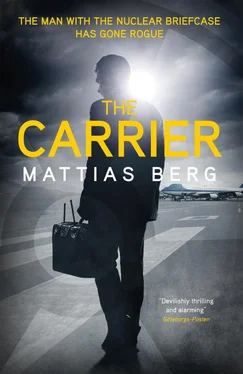Mattias Berg - The Carrier
Здесь есть возможность читать онлайн «Mattias Berg - The Carrier» весь текст электронной книги совершенно бесплатно (целиком полную версию без сокращений). В некоторых случаях можно слушать аудио, скачать через торрент в формате fb2 и присутствует краткое содержание. Город: London, Год выпуска: 2019, ISBN: 2019, Издательство: MacLehose Press, Жанр: Триллер, на английском языке. Описание произведения, (предисловие) а так же отзывы посетителей доступны на портале библиотеки ЛибКат.
- Название:The Carrier
- Автор:
- Издательство:MacLehose Press
- Жанр:
- Год:2019
- Город:London
- ISBN:978-0-85705-788-4
- Рейтинг книги:4 / 5. Голосов: 1
-
Избранное:Добавить в избранное
- Отзывы:
-
Ваша оценка:
- 80
- 1
- 2
- 3
- 4
- 5
The Carrier: краткое содержание, описание и аннотация
Предлагаем к чтению аннотацию, описание, краткое содержание или предисловие (зависит от того, что написал сам автор книги «The Carrier»). Если вы не нашли необходимую информацию о книге — напишите в комментариях, мы постараемся отыскать её.
The Carrier — читать онлайн бесплатно полную книгу (весь текст) целиком
Ниже представлен текст книги, разбитый по страницам. Система сохранения места последней прочитанной страницы, позволяет с удобством читать онлайн бесплатно книгу «The Carrier», без необходимости каждый раз заново искать на чём Вы остановились. Поставьте закладку, и сможете в любой момент перейти на страницу, на которой закончили чтение.
Интервал:
Закладка:
Then we were swallowed up into nothingness. Only the merest pencil-thin line in the wall betrayed where the opening was, before the hidden door closed soundlessly behind us. Once we were past the air lock, everything was silent and sterile, as if someone had switched off the chaos and the racket out in the arrivals hall. We were now in the sealed wing of the airport, named after John Foster Dulles, of all people. Our Secretary of State during one of the most intense phases of the Cold War, in the middle of the ’50s when the hydrogen bomb went from prototype to usable weapon. And the man behind one of the most important concepts of nuclear war, “massive retaliation”, as well as the systematic deployment of our intercontinental missiles.
We had trained in here so often, simulated questioning which became progressively rougher over time, starting at West Point and continuing to the Team’s most realistic simulations of total terror attack with nuclear weapons. But there had been significant changes since then. The walls seemed thicker than I remembered, the doors half open to the empty interrogation rooms heavily fortified even since our escape three months earlier. Or maybe in preparation for our arrival, the forthcoming exchange. “The Prey” in return for “The Hostage”.
Without a word our escort led us away down the long corridor, past one interview room after the next. I counted the doors in order to keep myself oriented in the otherwise nondescript row: nineteen, twenty, twenty-one… Felt the lightness of the hybrid on my shoulders, the whole apparatus swaying in its cradle. Tried not to look down at the optically bewildering wall-to-wall carpet with the pattern of the deconstructed American flag. I already knew where he would stop. Yet I continued to count, as a way of meditating, processing, keying myself up. Thirty-three, thirty-four, thirty-five, thirty-six…
At last we arrived at what officially went by the unremarkable name of the “Interview Room”. Only used for our fiercest interrogation training sessions, with or without torture, and real life questioning of suspected global terrorists. Before they were then sent on in due course to Guantanamo or one of our top secret locations around the world.
We ourselves always called it “Fort Knox”—because the walls were said to be at least as thick. It was hermetically sealed, escape-proof, stifling. Even before the improvements.
With a small bow our escort opened the protective doors: I noted that they had acquired yet one more layer since I had last seen them, were now quadruple thick, before he closed them behind us from the outside. Left us alone with the one other person sitting in here. He was even larger than I remembered. More than 6.5 feet tall, at least 290 pounds of muscle, total control of his body when he finally got up to shake our hands with his enormous paw. Just him against the three of us. If we three had still been on the same team.
“Hi there. Welcome to my little den,” John said.
Quickly he went to our packs, took out our liquids, knew exactly where to find them. Literally poured out our whole supply into the drain in the tiled floor. Paid no attention to our weapons, the apparatus inside the hybrid, anything else—and we let him do it. Because in that situation we had no choice at all.
Then John sat down on the bench again, turned in on himself, eyes on the floor and fingertips together. Waited for the surprise which then came.
I had believed Edelweiss capable of a lot. Of most things; essentially everything.
But honestly not this.
5.06
I have read that a spider hears the sound of the prey in its web as tones: that the taut threads function like the strings of a guitar. That the spider can sense what sort of quarry it has caught from the frequency of the signal.
So as we sat locked inside Edelweiss’ lair, the Interview Room, in the spider’s web, he could very well have heard our music on the screens in his office. A soft tone rising to an atonal chaos as our group of visitors was brought in. One after the other, at short intervals, by the same escort that had brought us here to the sealed wing.
I closed my eyes, kept them shut, listened to the abrupt movements in the room, the rustling of clothes, the determined protests. The sounds of Jesús María, Ingrid, me.
And that of my former family.
Slowly I opened my eyes. Glanced hesitantly at Amba, under the cover of my new face. Her heavy make-up did not disguise the deathly pallor. She looked dogged, you could see the wild struggle going on inside her, holding all too few of the keys she needed to unlock the situation. Ever since I had vanished she had probably tried, in her usual way, to “interpret” everything, to get some idea of what might have happened, to make sense of it all, without being able to understand even the first premise. That we never had been that perfect academic couple: she an art historian, a specialist in the detection of fake baroque paintings, I a moral philosopher with a particular focus on the dilemma of nuclear weapons. That I had been living two parallel lives since my first year at university—which was in no way to say that I had not put my heart and soul into them both.
It was a masterly performance on Edelweiss’ part. Directed at me and me alone: a thrust straight into my heart. A sublimely fiendish way of reminding me of the range of his talents. That he would stop at nothing, had mastered all the arts. Of how high the stakes were. In case I might have doubted it, or forgotten.
And this was only the beginning.
Edelweiss’ act of bringing me and my family together now—more than three months after my flight, when things might have been starting to settle—was only his first move. Ripping the wounds open again, the grief, the sense of loss, the stitches. Placing us directly opposite each other to maximize the drama. John with Amba and the children on one side of the room, on the bare bench which ran the length of the wall and had the word INTERVIEWER burned onto it. Myself, Ingrid and Jesús María on the opposite bench, marked INTERVIEWEE, with the hybrid and all our other packs tucked under the bench. And thin mirrors running at eye level from one end of the opposing walls to the other.
It had been in here, during the West Point advanced course, that Edelweiss for the first time used his expression “the Theater of the Body”. Said that it was this and this alone which unfolded in the mirror facing the interviewee’s bench. And that they just could not help watching themselves, hastening their breakdown.
I continued to observe Amba, since I could not bring myself to look at the kids—and since for a long time she hardly seemed to notice my eyes on her. She was formally dressed, as if going to a party, with yet another newly bought sari, bright red, the sparkling end of the cloth draped over her head. She could easily have come straight from some event, or maybe just the Friday gathering of our neighbors in the academics’ housing complex where Volvos from the 1990s stood sloppily parked in front of the hawthorn hedges trimmed without care.
Her clothes nevertheless gave me some comfort, if one could talk at all of comfort in this situation. The sari did not look like prison clothing at least. Although Edelweiss could have dressed his pawns in whatever costumes he chose.
It was clear that her thoughts were racing. Soon she too, without ever letting the children out of her sight, watching closely for the slightest reaction beyond their strange calm—the apathy of deadly fear—looked back at us as we sat along the opposite bench. Our anonymous little delegation.
A very short woman with the red hair of the Irish and a pleated skirt. A tall woman with gray hair and a certain likeness to Greta Garbo. A super-fit man with a big blond beard.
Читать дальшеИнтервал:
Закладка:
Похожие книги на «The Carrier»
Представляем Вашему вниманию похожие книги на «The Carrier» списком для выбора. Мы отобрали схожую по названию и смыслу литературу в надежде предоставить читателям больше вариантов отыскать новые, интересные, ещё непрочитанные произведения.
Обсуждение, отзывы о книге «The Carrier» и просто собственные мнения читателей. Оставьте ваши комментарии, напишите, что Вы думаете о произведении, его смысле или главных героях. Укажите что конкретно понравилось, а что нет, и почему Вы так считаете.












